Written by admin - September 8th, 2019 - News
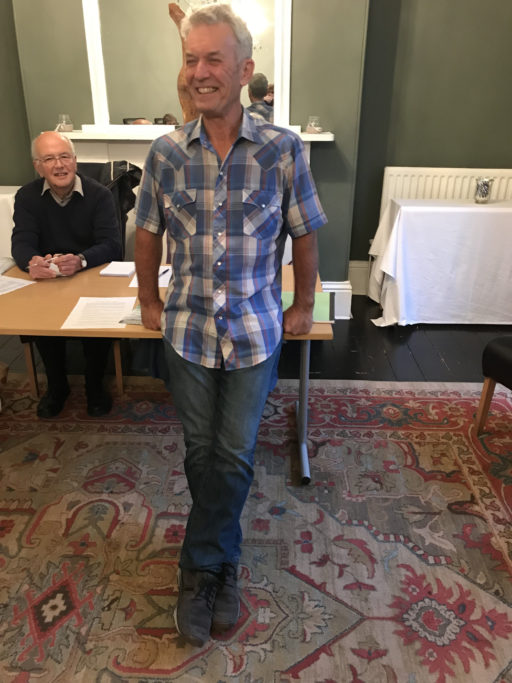
Sheila welcomed Paul Zealand and his wife Stella to the meeting and invited Paul to talk about storytelling in the oral rather than the written tradition. Paul began by saying that he had once been a hobby writer but had lost interest in the written word. His active interest in Morris Dancing had taken him to the Whitby Folk Festival where he had attended a storytelling workshop and things had taken off from there. He reminded his audience that as human language developed, humans would tell stories or things in story form as a way of passing on information and ideas. Storytelling is not reading aloud or reciting but finding a story and relating it.
Paul then went on to tell several stories, linking them with comments on the tradition, its contents and its techniques, including the ‘Rule of Three’ which says that mentioning something three times is more effective than any other number. He then invited questions from members.
After the refreshment break Paul invited members to develop a story by choosing objects at random from a bag. He concluded with another story.
Sheila thanked Paul for his talk and presented him with a token of the Group’s appreciation.
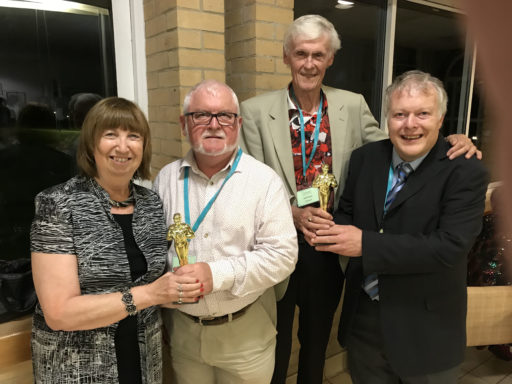
As a regular attender at Swanwick (Writers’ Summer School) since 2006, Maggie was delighted to have her five minute script ‘Bill’s Last Night’ chosen to be performed as a rehearsed reading at this year’s Page to Stage event. Her pleasure was intensified when it won the ‘Swanny’ for Best Drama. None of this would have been possible without fine acting from fellow Swanwickers Geoff Parkes and Andy Cain under the directorship of Neil Zoladkiewicz. Geoff also won the award for Best Performer in a Drama!
Now, thanks to the technical expertise of yet another Swanwick regular, Steve Barnett, it’s available to watch on YouTube. Here’s the link: https://www.youtube.com/watch?v=L6moGTOPGXo&feature=youtu.be&fbclid=IwAR1ZbqEBOrQs6Ce_Kl8HszEr8mNq6K_-4IORL-vFpJRGbFfj8ohDL1RDI7I
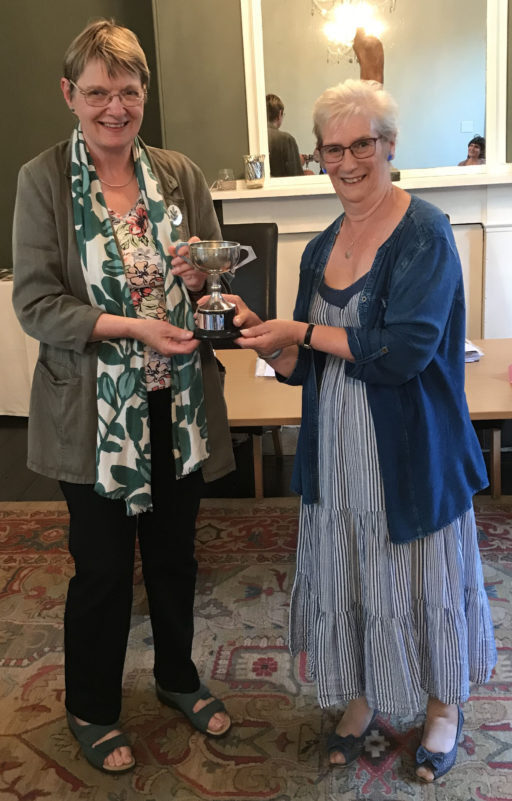
Anne Powell began her adjudication by giving some background to the trophy presented to the Group by her mother. She went on to say that she had enjoyed the eleven entries, which had covered such a wide range of topics – including eco issues, murder and geriatric drug dealing – that it had been difficult to make a judgement.
After presenting her comments on the individual entries Anne announced the results as follows:
• Winner – Susan Perkins with ‘Brief Notes on the First Week of a Very Big Undertaking’
• Runner-up – Christine Summers with ‘Parenthood’
Anne presented Susan with the trophy. The entries were then read in the following order:
• Susan – ‘Brief Notes on the First Week of a Very Big Undertaking’ – a retelling of the Genesis Creation story
• Christine – ‘Parenthood’ – a young woman mourns the loss of a baby whose heart had stopped beating several days earlier
• Caroline – ‘Stop the World I Want to Get Off’ – a man sitting by a canal gets a disapproving look from a passing jogger
• Phil – ‘When is a Good Turn not a Good Turn’ – a spider rescued from a house is eaten by a bird
• Peter H (Read by Sheila in Peter’s absence) – ‘It’s Time to Tell her’ – a man wants to tell a woman that he loves her but when he spots her she is with someone else
• Sheila – ‘You Couldn’t Write it . . . . ‘ – an Oregon novelist who has written on the subject of husband murder eventually becomes the suspect when her own husband is murdered
• Peter P – ‘What the Picture Suggested’ – a story of possible murder inspired by a painting of an empty potting shed seen in a local art exhibition
• Maggie – ‘Vaudeville Stars’ – piano playing Siamese twins discuss a former lover
• Carol – ‘These Days’ – the frustrations of growing old
• Janet – ‘The End of the Line’ – a bee killed in a kitchen fails to fertilise the flowers in a nearby orchard
• Joe – ‘Self-help at St Peters’ – a very elderly stalwart of a local church is discovered to have been involved in growing cannabis
After all eleven entries had been read Sheila invited Anne to share a piece of her own writing. She obliged with the short story ‘Ripples’, inspired by childhood memories of her grandparents’ house in Denby Dale.
Sheila then thanked Anne for her adjudication and presented her with a token of the Group’s appreciation. Members present reinforced the thanks in the usual manner and Anne took her leave as she had a 1½ hour journey to return home.
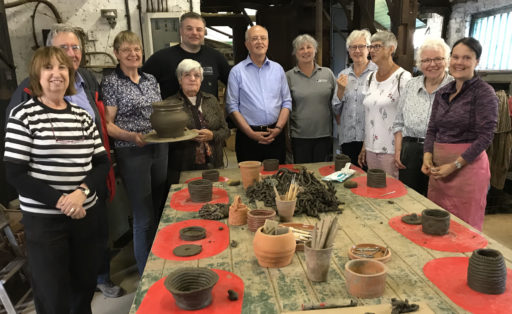
Our outing this year, organised as efficiently as ever by Susan, was to Littlethorpe Potteries. Owner Mark Curtis told us a great deal about the history, culture and tradition of the potteries before demonstrating the old working machinery used by several generations of his family. Then we all gathered round the wheel to watch him throw a large pot, talking us through all the different stages as he worked the clay.
His wife Ruth then took over to add to what Mark had already said about drying and firing, after which she settled us down round a large table to have a go at making coil pots. Finishing or ‘fettling’, as Ruth put it, is her main area of expertise and she showed us various ways of decorating our new creations. We were all encouraged to add our initials so that we can have them back after firing.
Yesterday’s rain made conditions in the clay pit too hazardous for close inspection, but some of us walked across the fields to take a look from a safe distance before thanking Mark and Ruth for a very enjoyable and informative afternoon.
It remains to be seen what stories, poems and articles will be written as a result of this memorable visit.
Much more information about Littlethorpe Potteries can be found at www.littlethorpepotteries.co.uk
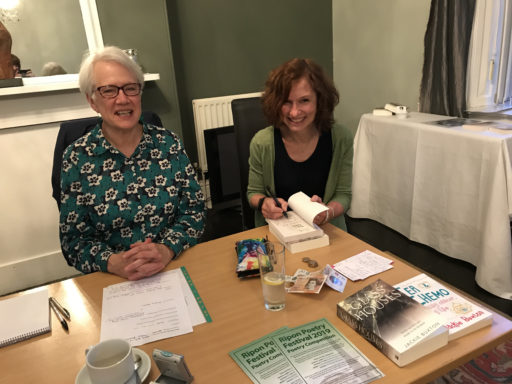
Writer and teacher Jackie began by warning us that she had problems with hearing loss. She said she had a copy writing background and that she liked the longer story format. Her two published books are the self-help ‘Tea and Chemo’ (2015) and the novel ‘Glass Houses’ (2016).
Jackie then went on to describe how she had kept a diary from the age of 13 until at 23 she abruptly stopped. During that time she sometimes found herself using the prose writing to keep her sane, particularly after some serious adverse events in her life. She said that she found two benefits from writing – writing as therapy and writing providing a focus in an increasingly multi-tasking world.
After reading languages at university, Jackie worked for a while in charity fundraising. On being made redundant she decided to take a year to write a novel (which she did) and do freelance copy writing. During that time she had her first child, followed in due course by another. The writing had to stop when one of her very young children suffered a stroke. Although the child recovered, her childhood was very intense so Jackie found that no writing other than copy writing was possible. Nevertheless she was desperate to write. The turning point came when she went on an Arvon course and wrote 10,000 words. She never returned to the first novel, having realised that she had outgrown it.
Jackie then went on to describe how she had got the inspiration for ‘Glass Houses’ from a couple of real-life events. As a result of repeated rejections of the resulting novel, despite targeting her submissions, she chose to do a six-week on-line self-editing course which was very intensive but very helpful. In 2014, halfway through the massive rewrite/edit of the original manuscript which then followed, she got cancer which made the rewriting painfully slow. During that time she ran a blog about cancer and the information she gathered, trying to make it positive. Seeing an opportunity to turn the blog into a book she wrote a precis of what that book might contain and sent it off. At the same time she was submitting the revised ‘Glass Houses’. The result was a phone call saying that a publisher wished to publish both. Further books are in the pipeline although at this stage their precise fate is still uncertain.
After the tea break Jackie answered questions. Among other things she said that she was somewhere between a plotter and a ‘pantser’ although she usually started with a particular final scene in mind. Research can alter the initial plot.
At the end of the talk Sheila and Susan expressed the Group’s thanks to Jackie for what was a very interesting and informative talk.
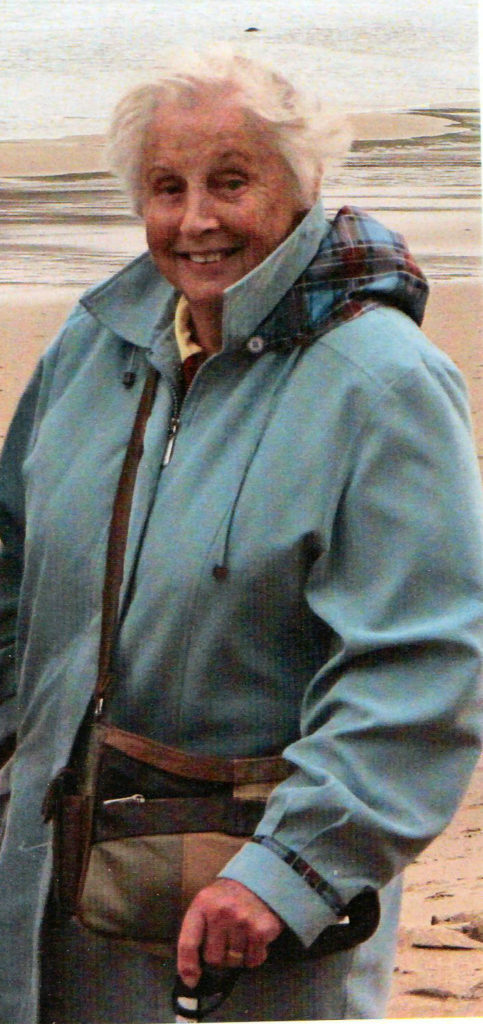
We were saddened to learn about the passing of Elizabeth Spearman, a very long-standing member of the Group, and offered our condolences to her family.
Elizabeth’s funeral took place at Holy Trinity Church on Friday 3rd May 2019 at 11 a.m. with many of us in attendance. Memories of Elizabeth’s friendship and talent for writing, especially poetry, will live on in our hearts.
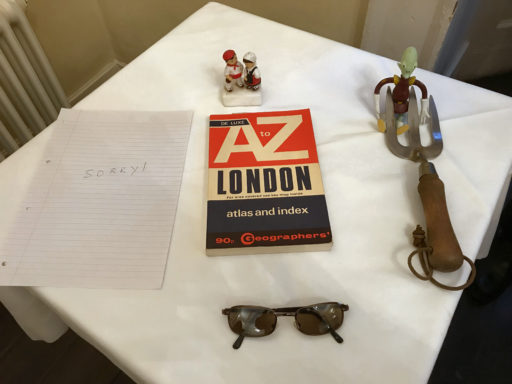
The writing challenge for the 28th May meeting is to incorporate ALL SIX objects in the photograph above.
For clarification, the layout isn’t necessarily significant. Feel free to interpret the items as you wish, but for those who wish for more detail, they are as follows:
a garden fork
the word SORRY written on a piece of lined paper (A4 with holes for a ring binder)
a figurine of an alien (actually Captain Kif Croker from Futurama)
figurines of two children in Basque national dress
an A-Z of London
a pair of sun glasses
GOOD LUCK!
Older Entries »








